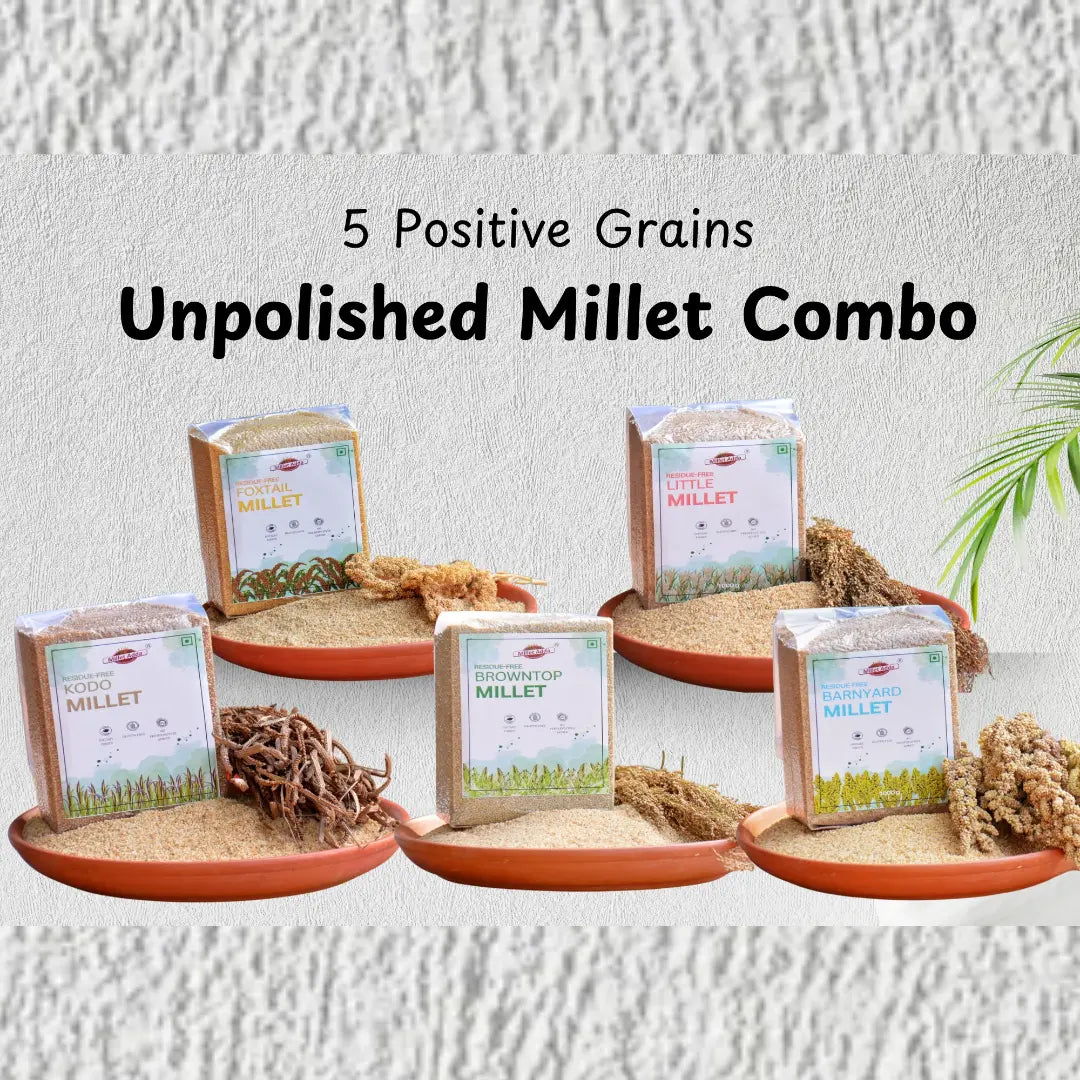What Are Positive Millets?
Long before rice and wheat became global staples, millets were among the first crops cultivated by humans. Today, these super grains are experiencing a resurgence, often referred to as "positive millets" due to their exceptional nutritional benefits and environmental sustainability. Not only do these grains pack a nutritional punch, but they are also an eco-friendly choice, known for their ability to thrive in dry, arid regions. Far more than just a health trend, positive millets are seen as a global effort to fight food insecurity and promote sustainable, green diets. Let’s dive deeper into their benefits.
What Are Positive Millets?
Positive millets are a group of millet grains with dietary fiber content ranging from 8% to 12.5%, prized for their high nutritional value and environmental advantages. The main types include foxtail millet, little millet, barnyard millet, kodo millet, and browntop millet.
What Makes Positive Millets Special?
- Nutritional Powerhouses: These millets are packed with essential nutrients, including fiber, protein, and vital minerals like calcium and iron, providing a balanced source of carbohydrates and protein in a single grain.
- Eco-Friendly Farming: Millets are incredibly resilient, growing well in tough conditions with minimal water and fertilizers, making them a sustainable agricultural choice that has a smaller environmental footprint.
- Culinary Flexibility: From traditional dishes like idlis, dosas, and khichdi to modern foods such as pasta, cakes, and cookies, positive millets can be used in a variety of recipes, adding both nutritional value and flavor.
- Health Benefits for Chronic Disease Management: Thanks to their low glycemic index, antioxidant content, and high fiber levels, positive millets are beneficial for managing chronic diseases like diabetes, obesity, and heart conditions.
Different Types of Positive Millets:
1. Foxtail Millet
- Other Names: Known as kangni in Hindi, korralu in Telugu, and Thinai in Tamil.
- Benefits: This millet is rich in protein, iron, and fiber, making it great for managing blood sugar and supporting heart health.
- Nutrition: 100 grams provides 11.2 g of protein and 14 mg of calcium.
2. Little Millet
- Other Names: Called kutki in Hindi, samai in Tamil, and samalu in Telugu.
- Benefits: It is gluten-free with a mildly sweet flavor, perfect for weight management and improving gut health.
- Nutrition: 100 grams contains 10.3 g of protein and 32 mg of calcium.
3. Barnyard Millet
- Other Names: Known as samwa in Hindi, odalu in Telugu, and kuthravali in Tamil.
- Benefits: High in fiber, barnyard millet aids digestion and helps in detoxifying the body.
- Nutrition: 100 grams has 7.7 g of protein and 17 mg of calcium.
4. Kodo Millet
- Other Names: Referred to as kodon in Hindi, arikelu in Telugu, and varagu in Tamil.
- Benefits: Kodo millet is great for those with gluten sensitivity and celiac disease, supports muscle repair, and has a low glycemic index.
- Nutrition: 100 grams provides 7.7 g of protein and 17 mg of calcium.
5. Browntop Millet
- Other Names: Known as hari kangni in Hindi, kula samai in Telugu, and anda korra in Tamil.
- Benefits: This rare millet is packed with antioxidants, supporting better immunity and bone health.
- Nutrition: 100 grams contains 9 g of protein and 28 mg of calcium.
Health Benefits of Positive Millets
- Packed with Nutrients: Millets are full of B-vitamins like niacin, thiamin, and riboflavin, as well as minerals and antioxidants that support overall health. For a heart-healthy snack, try Millet Murukku.
- Gluten-Free: All millets are naturally gluten-free, which makes them a great option for those with gluten sensitivity or celiac disease.
- Supports Weight Management: The high fiber content in millets helps you feel full, reducing the urge to eat more, which helps with weight control.
- Improves Digestive Health: Millets are good for your gut and can help prevent digestive problems like bloating and constipation.
- Regulates Blood Sugar: Their low glycemic index makes millets a suitable food choice for diabetics.
- Boosts Heart Health: Millets are rich in magnesium and potassium, both of which support heart health.
- Enhances Immunity: Millets are packed with antioxidants like polyphenols that protect against the harmful effects of free radicals in the environment.
- Environmentally Friendly: Millets need less water and resources to grow, making them a sustainable option for farming.

